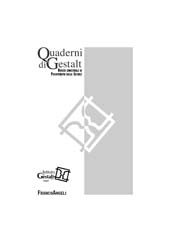La qualità della relazione precoce genitori-bambino : introduzione di una scheda/intervista psico-relazionale nei bilanci di salute in età pediatrica : primi risultati per la fascia d'età 0-36 mesi
51-70 p.
L'obiettivo di questo lavoro promosso da un gruppo di ricerca SIPG (Società Italiana Psicoterapia Gestalt), SIP (Società Italiana Pediatri) e SINPIA (Società Italiana Neuropsichiatri Infanzia e Adolescenza),è stato quello di creare una scheda semplice e intuitiva (Scheda Psico-Relazionale), da somministrare nei bilanci di salute pediatrici, che valuti lo sviluppo psicologico del bambino e lo sviluppo relazionale genitori-bambino, finalizzata ad una valutazione finale su due parametri di allerta. Sono state raccolte 141 schede per la fascia d'età 0-36 mesi. I risultati sono in linea con le aspettative e con i contributi teorici precedenti. Vengono discussi i limiti dello studio e i suggerimenti per la ricerca futura. Il nostro gruppo di ricerca in futuro valuterà tutta l'età pediatrica 0-14 anni. [Testo dell'editore]
There are very time-consuming and demanding procedures for assessing the early parent-child relationship. The aim of this research was to create a simple and intuitive form to be administered in pediatric health reports that assesses the child's psychological development and the parent-child relationship (Psycho-Relational Form), leading to a final evaluation on two alert parameters; Level 1: the pediatrician re-evaluates the psychological and relational aspects at the next health report; Level 2: psychological/psychotherapeutic or neuropsychiatric counselling is required.e suggestion of the Italian Society of Gestalt Psychotherapy (SIPG), a research group was set up with the Italian Society of Pediatrics (SIP) and the Italian Society of Child Neuropsychiatry (SINPIA), which constructed the Form and had it administered by a number of family pediatricians
Thirty cards were collected from 1-month-olds, 30 from 3-month-olds, 30 from 6-month-olds, 23 from 12-month-olds, 17 from 18-24-month-olds and 21 from 36-month-olds (total of 141 cards for the age group 0-36 months), with random sampling of children who presented themselves at the Health Report. Using statistical instruments, the relational and psychological manifestations of the child, the emotional-psychological state of the parent and the quality of the parent-child relationship were investigated. In the first few months of life, the children considered attain almost all the elements provided for in the form, while at 18-24 months there was a decrease in the capacities attained, which increased again at 36 months. A significant difference emerged between mother and father in the change in mood and feeding from the child's birth until 12 months and in the change in sleep from 0 to 36 months
The father's sleep alteration changed in the various age groups of the child: it was more present when the child was 1 month old and tended to decrease as the child grew. Finally, a difference could be seen in the child's accompaniment to the pediatric visit: at 1 month, most of the children considered were accompanied by both parents, whereas as they grew older, they were increasingly accompanied by only one parent, mainly the mother. The results turned out to be in line with expectations and previous theoretical contributions. The limitations of the study and suggestions for future research are discussed. In the future, our research group will evaluate the entire pediatric age range 0-14 years. [Publisher's text]
-
Articles from the same issue (available individually)
-
Information
ISSN: 2035-6994
DISCIPLINES
KEYWORDS
- Valutazione relazionale prevenzione psicologica collaborazione interdisciplinare scheda psico-relazionale bilancio di salute pediatrica
- Relational assessment psychological prevention interdisciplinary collaboration psycho-relational board pediatric health assessment


